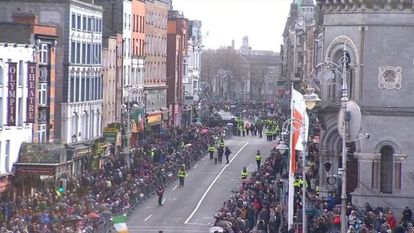 Op-ed: Easter Sunday, March 27, 2016, hundreds of thousands of people lined the streets of Dublin as part of an event to mark the 100th anniversary of the 1916 Easter Rising also known as the Easter Rebellion; a rebellion which was an attempt to remove British rule in Ireland. The Easter Rising is remembered each year in a series of events in Ireland but this year it is special; 100 years have passed. The crowds were in Dublin to watch a military parade which is the culmination of a series of centenary commemoration events in the Republic of Ireland. The Easter rebellion used English involvement in World War One to advantage. As so many British military personnel were fighting in Europe it was in some ways the perfect time to try for independence. But it was an armed insurrection and as a result fourteen leaders of the Easter rising were executed by the British. A free Irish state however followed. "The state was created as the Irish Free State in 1922 as a result of the Anglo-Irish Treaty. It had the status of dominion until 1937 when a new constitution was adopted, in which the state was named "Ireland" and effectively became a republic, with an elected non-executive president as head of state. It was officially declared a republic in 1949, following the Republic of Ireland Act 1948" Wikipedia. The Republic of Ireland accounts for more than two thirds of the land mass of Ireland. There have been appalling acts in Ireland's troubled history from all sides and the English got it wrong so many times. Ireland has had a troubled past and ripples still surface from time to time in Northern Ireland. Again there is the age old question of when is a terrorist a terrorist and when is he a freedom fighter. In the 21st Century that question remains unanswered. Some would say it depends who has what to gain from the outcome. Religious differences continue to play their part in Northern Ireland. Each year Orange Parades, protestant, remember long dead events and people from Northern Ireland's troubled history. Today it is about the Catholics of Ireland; some in Northern Ireland still yearn for full freedom from we British. Two separate Christian factions ironically resemble two sections of Islam, Sunni and Shia Muslims. But today is a day about peace. We can remember our past failings and show respect to those who died in very different times; or were they so very different? This English person wishes the people of Ireland well and hopes peace in that country lasts. Peaceful independence or peaceful co-existence has to be better than turmoil and conflict. As Wikipedia notes many of the Easter rising deaths were a result of the British military's response and reactions to the rising: The Easter Rising (Irish: Éirí Amach na Cásca) also known as the Easter Rebellion, was an armed insurrection in Ireland during Easter Week, 1916. The Rising was launched by Irish republicans to end British rule in Ireland and establish an independent Irish Republic while the United Kingdom was heavily engaged in World War I. It was the most significant uprising in Ireland since the rebellion of 1798.
0 Comments
|
On this Day in History
The following pages carry notable dates for each month of the year while this blog will carry features for some of those dates: Archives
April 2016
Categories
All
|

 RSS Feed
RSS Feed
